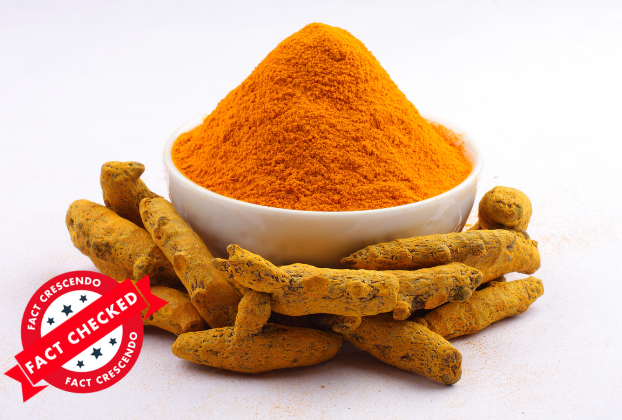Turmeric, a golden-yellow spice derived from the Curcuma longa plant, has long been praised for its medicinal properties. Its active compound, curcumin, is known for its antioxidant and anti-inflammatory effects. Recently, a claim has emerged that turmeric powder can promote weight loss. However, we found that this claim is not strongly supported by scientific evidence.
Social Media Posts
Some social media users have shared recipes containing turmeric powder with claims that turmeric can help with weight loss.
Fact Check
Scientific Evidence: Some Benefits, But Results Vary
Research has examined how curcumin (the active compound in turmeric) might affect weight. The evidence shows some small benefits, but the results vary depending on the situation.
- A large 2023 review of 60 clinical trials with 3,691 participants found that turmeric supplements led to an average weight loss of about 0.8 kg (less than 2 pounds). Some improvements in waist size and metabolic hormones were also observed. However, the researchers noted significant differences between studies, meaning we should be careful about drawing firm conclusions.
- A 2019 study focusing specifically on people with metabolic syndrome found that curcumin did help reduce weight, BMI, and waist size. The researchers believe this might be due to curcumin’s anti-inflammatory properties, as inflammation is linked to obesity.
- Not all research agrees, though. A different 2019 analysis looking at people with fatty liver disease found no significant weight changes between people taking curcumin and those taking a placebo.
Taken together, these findings suggest that curcumin may provide limited support for weight loss, but the effects are small and vary between studies. At best, turmeric should be considered a possible supporting tool, not a main weight loss strategy.
Expert Opinions: Mixed Reviews, No Strong Support
Leading medical experts and organizations urge caution in interpreting turmeric’s weight-loss benefits:
Dr. L.P.A. Karunatilake, who specializes in general surgery, urology, and anorectal diseases, explained to the Fact Crescendo team: “According to authentic Ayurveda medical systems, this presentation is not only incorrect but could also lead to long-term adverse effects on users. Turmeric (Ayurvedic name: Haridra) is a valuable medicinal herb in Ayurveda. It has numerous medicinal properties for various health conditions and is used as a spice in food preparation due to these properties, but only in proper quantities. To gain medicinal benefits, strict rules must be followed; otherwise, side effects will occur. The amount, method, and duration of usage are crucial. Any medicinal substance used improperly will definitely cause adverse effects if: 1) used excessively (Athi), 2) used insufficiently (Heena), or 3) used incorrectly (Mithya).”
Debjani Gupta, a nutritionist based in Mumbai, India, explained to First Check that “No tea or concoction can deliver healthy weight loss if the diet is not balanced, wholesome and consumed in a calorie deficit according to individual goals. Such quick hacks can often cause gastric distress and severe allergic conditions.”
Medical experts show little support for turmeric as a weight loss aid. According to Medical News Today, physicians rarely recommend turmeric for weight loss because its effects are so limited. Most health professionals emphasize that any benefits from turmeric typically only occur when combined with proper diet and exercise, not as a standalone solution.
Furthermore, the U.S. National Center for Complementary and Integrative Health (NCCIH) clearly states there is insufficient evidence to confirm turmeric or curcumin’s benefits for any health condition, including obesity. Experts consistently note that more comprehensive, high-quality research is needed before any definitive claims can be made.
So, while curcumin may support metabolic health, medical experts do not advocate turmeric as a primary or proven weight-loss method. Its role is, at best, supportive.
Comparison with Other Weight-Loss Methods
The foundation of sustainable weight loss remains caloric balance: burning more calories than consumed. A healthy diet and regular physical activity can yield 0.5-1 kg of fat loss per week, which is vastly more effective than turmeric, which averages ~0.8 kg over several weeks or months.
Compared to other natural supplements, turmeric works about as well as green tea extract, CLA (conjugated linoleic acid), or glucomannan fiber, which is to say, not very dramatically. For example, a thorough scientific review (Cochrane) found that green tea extracts only helped people lose between 0.5-1.5 kg (about 1-3 pounds), and many times these small changes weren’t even statistically meaningful.
For people who need to lose more weight, doctor-prescribed medications (like GLP-1 drugs such as Ozempic or Wegovy, or medications like orlistat) can help them lose 5-15% of their body weight. For even more significant weight loss, bariatric surgery (like gastric bypass) provides larger and longer-lasting results. (Source)
Safety and Cautions
Turmeric in cooking is generally safe. However, the active component (curcumin) makes up only 2-5% of regular turmeric powder. This means you’d need concentrated supplements to match the amounts used in research studies, which typically use 400-600 mg of curcumin 2-3 times daily.
While moderate amounts of curcumin supplements are usually well-tolerated, higher doses can cause digestive issues like nausea or diarrhea. More concerning is that curcumin can interact with certain medications, particularly blood thinners like warfarin, potentially increasing bleeding risk.
Individuals with certain medical conditions or those taking medications should consult with a healthcare provider before using turmeric or curcumin supplements. This includes people with gallstones, kidney stones, iron deficiency, bleeding disorders, and those who are pregnant or breastfeeding. (Source)
Conclusion
Turmeric may offer some mild metabolic benefits that support weight management, but the effect is limited, not guaranteed, and far less significant than lifestyle-based or clinical interventions. It can be safely included as part of a healthy diet, but should not be relied on as a primary tool for weight loss. There is no medical consensus or official endorsement of turmeric as a weight-loss treatment.







